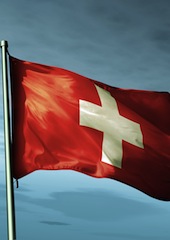CEO Pay: A Swiss Rebellion
What will be the ramifications of a Swiss referendum on executive compensation?
November 21, 2013

Switzerland is an unlikely place to start a global revolution. And it is even unlikelier that such a Swiss-made revolution would seek to attack one of the citadels of Western-style late 20th century capitalism – exorbitant levels of CEO compensation.
And yet, next Sunday, on November 24, Swiss voters will go to the polls to cast their votes on a referendum trying to cap top-level executive pay.
The “1:12 Initiative” – designed to limit compensation at twelve times the salary of the lowest paid worker in the company – has had tempers in Swiss public life boiling for several weeks.
This vote follows on the heels of another earlier this year, when in early March 2013, an angry mob of voters in Switzerland – not France or Argentina – gave the so-called “Rip-Off Referendum” a decisive victory.
A solid majority of Swiss voters supported a constitutional amendment to make Swiss corporate governance laws the toughest in the world, by giving shareholders in Swiss public companies the strongest rights in the world.
The new laws now require a shareholder vote on executive compensation, ban sign-on bonuses, golden parachutes and certain forms of profit sharing – and enforce all of the above with criminal sanctions.
The first big move
In the annals of the history of global capitalism, this was the first big move to rein in (the often-misaligned incentives of) executive compensation. As with the global battle against corporate tax evasion, there will be setbacks along the way, but the battle has been joined.
Switzerland is leading the way in transforming governance in publicly traded corporations. The Swiss have delivered at the polls what governance activists globally have been demanding for decades: a requirement that compensation packages not only need to be disclosed in public filings, but approved by a free vote of shareholders.
That this happened in Switzerland – known for its love of money, low taxes and strong local-level democracy – is significant. It was about the least likely candidate to rise to the rank of global vanguard of a key issue of social and economic equity.
Compare Swiss action, for example, with U.S. inaction. The world still remembers the scenes at Zuccotti Park in New York City in the fall of 2011, where the Occupy Movement voiced its anger at Wall Street.
Sure, the protesters assembled there got the sympathy and support of the 99 Percent, but the main Occupy Wall Street group ultimately got evicted from the park and died soon after.
Swiss democracy
The Swiss, though, got the job done. They may seem an unlikely bunch to resuscitate the voice of the 99 Percent.
Chalk it up to Swiss efficiency – and democracy. In Switzerland’s system of direct democracy “of the people, by the people, for the people” – to borrow the phrases from Abraham Lincoln’s Gettysburg Address – the 99 Percent not only have a voice. They do wield very real political power.
The world over, the level of inequality of compensation for an honest day’s work has increased significantly over the past few decades. By all accounts, it seems as though the cycle has now somehow reached its culmination point.
More C-suite executives in publicly traded multinational corporations, not just in the United States, but typically more self-restrained places such as Switzerland and Germany are taking home paychecks in the eight-figure range than ever before.
Novartis’ departed Chairman Daniel Vasella, Credit Suisse’s Brady Dugan and Volkswagen’s Martin Winterkorn have become the Jamie Dimons of Europe.
They not only enjoy compensation packages far beyond any reasonable level. In yet another unexpected form of a European plebiscite, they have also become some of the most criticized, if not vilified and detested chief executives – with the criticism being launched from within the European business community.
Bedrock for rebellion
It should come as no surprise that the greed of the few is met by the resentment of the many. Jealousy has turned into anger and outrage in an economy where corporations hoard profits, avoid creating jobs or shrink their workforce.
Meanwhile, for its destructive work on the real economy, the C-suite – creating little to no real economic value — gets rewarded with outrageous bonuses. One does not have to be a Marxist to understand how the excesses of the past decades have created bedrock from which rebellions are taking off.
The effort underway in tiny Switzerland is to revive the original power of capitalism, which – via markets and fair, but not excessive compensation – was to bring economic benefits to many. That also meant wresting power from the hands of a few.
That said, recent polls indicate that the 1:12 referendum will be defeated. To the majority of likely voters, this kind of interference with free markets seems to go too far. It is one thing to give shareholders the power to stop excessive compensation, as happened in the March plebiscite. It is quite another to give the state the power to dictate compensation.
Nevertheless, the effort to bring back a healthy capitalism, and end the absurd revival of feudalism in a modern adaptation, is gaining steam. The cozy and opaque world where public company boards make compensation deals with their executive teams, which are as secret as they are sweet, has seen its day.
Corporate democracy
After all, a corporation – properly understood – is like a democracy. Shareholders are not only the ones with capital at risk, but also the ones equipped with the voting powers. Given the corporate malfeasance of past years, they will be much harder to stay so inactive in exercising their voting rights.
Make no mistake: the corporate elites in Switzerland dislike the new rules just as much as their peers in the United States and elsewhere. This change was not initiated by the elites.
Too bad only that the Swiss are still the only country on the globe where direct democracy does rule and where the people, once awakened, have the opportunity to make their own laws.
The hope remains that other countries will follow the Swiss example. The European Parliament has voted to rein in bonus practices. The German government is interested in taking action to restore popular confidence in capitalist economy.
The big and odd man out? None other than the United States, the country that provided the world with the original ideas about shareholder democracy and corporate governance. Lest it wants to be outdone by Switzerland, it is high time for the United States to leave all the theorizing behind and to take action.
Takeaways
Switzerland is leading the way in transforming governance in publicly traded corporations.
The Swiss may seem an unlikely bunch to resuscitate the voice of the 99 Percent, but they have direct democracy.
In Switzerland’s democracy “of the people, by the people, for the people,” the 99 Percent wield very real power.
The world over, the compensation for a day’s work has grown significantly more unequal over the past few decades.
The effort to bring back a healthy capitalism, and end an absurd revival of feudalism, is gaining steam.
A corporation is like a democracy. Shareholders risk capital, but also are equipped with the voting powers.
The corporate elites in Switzerland dislike the new rules just as much as their peers in the US and elsewhere.
Switzerland is the only place where the people, once awakened, have the opportunity to make their own laws.
The big and odd man out? None other than the US, home of shareholder democracy and many corporate governance ideas.


